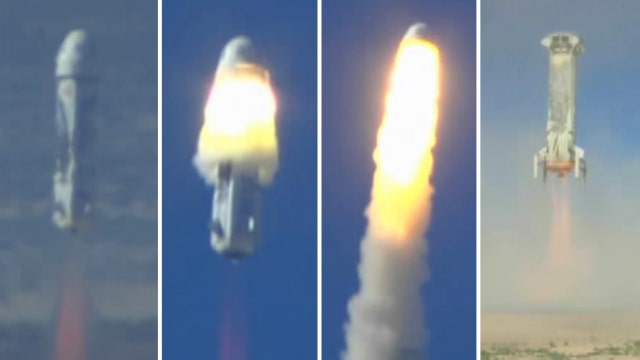Blue Origin rocket launches in historic test flight
Raw video: New Shepard rocket's escape system put to test
The rocket company Blue Origin pulled off what appeared to be a flawless two-part launch test in west Texas on Wednesday.
Not long after the startup's New Shephard rocket lifted off, the company carried out a planned emergency separation of its crew capsule. Boosted on a plume of fire produced by a solid rocket motor, the capsule successfully launched away from the rocket, and then descended safely back down to Earth under three large parachutes.
“There it is, 70,000 pounds of thrust, pushing that crew capsule at 400 miles an hour,” a Blue Origin commentator said after the separation.
As a bonus for the company, the rocket that the capsule had separated from continued on its flight, and then descended back down to land, sticking a landing back down in Texas. It was the fifth time that rocket had made such a landing.
Blue Origin had said in a blog item before the test that the escape system can “quickly propel the crew capsule to safety if a problem is detected with the booster.”
Related:
"That is one hell of a booster," Amazon's Jeff Bezos, the founder of Blue Origin, wrote on Twitter after the test.
While the company said that they did not think they would be able to recover the rocket after the test, the video posted by Blue Origin of the test showed the rocket landing upright, flames still licking out of its base.
That is one hell of a booster. #InFlightEscape #GradatimFerociter https://t.co/7ZRRe2HnMO
— Jeff Bezos (@JeffBezos) October 5, 2016
The rocket and capsule system are intended for suborbital flight and are called New Shepard after the first American in space, Alan Shepard. Bezos hopes to start launching tourists and other paying customers in the years ahead.
Blue Origin is aiming for reusability to lower launch costs. This rocket has flown five times and is now bound for a museum.
The Associated Press contributed to this report.









































